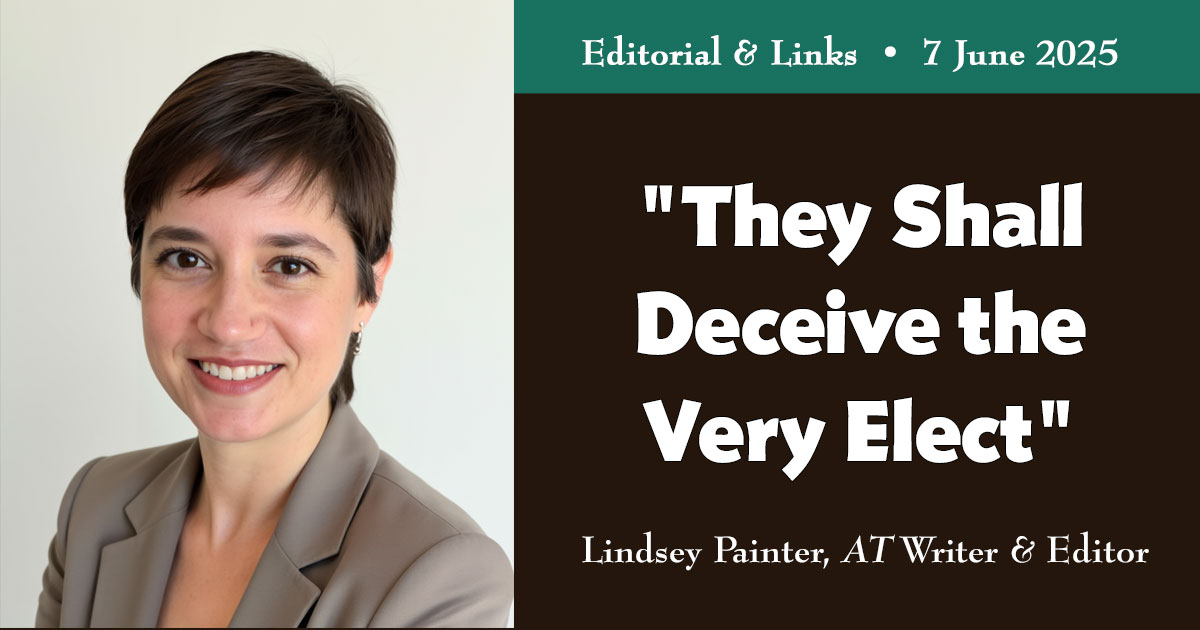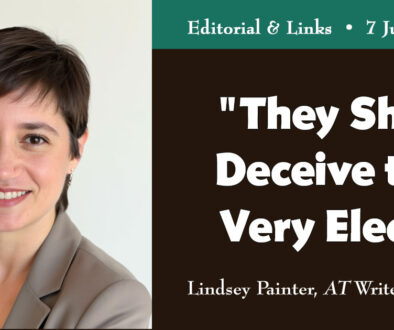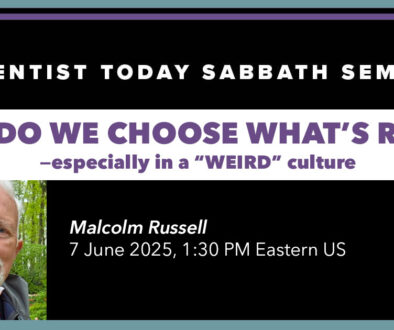Comments of the Week June 2–8
“Excellent and very true. Unless changes are made, the General Conference is only a reflection of gray-headed, American thought.” –Steve Tatum on St Louis, We Have a Problem!
Comments on They Shall Deceive the Very Elect; Exploring the 2025 General Conference Agenda; St. Louis, We Have a Problem; Social Activism: A Recessive Seventh-day Adventist (SDA) Trait; and Aunt Sevvy

EDITORIAL: They Shall Deceive the Very Elect
“It is of interest to me that your editorial points us in the direction of this verse from Revelation 18:4: ‘I heard another voice from heaven, saying, “Come out of her, my people, so that you will not participate in her sins and receive any of her plagues.”’ It seems to me that God’s elect will be walking away from any institution that does not live and teach the values that Christ lived and taught:
1 – Every individual is loved by God.
2 – True Christianity practices a radical equality among all: ‘You are all brothers.’
3 – Christianity values service.
4 – Christianity is a call to genuine community.
5 – Christ values people, not things, and an institution is a ‘thing.’
6 – Christianity is focused on LOVE.”


Exploring the 2025 General Conference Session Agenda
“I didn’t have time to read all those pages, but ChatGPT reads really quickly. I asked:
‘Please review this agenda for the SDA worldwide General Conference session to be held next month in St Louis, Missouri.
Are there any items to be voted on that have potential significance for everyday Seventh-day Adventists around the world? If so, please identify and explain the potential significance.’
1. Church Manual Revisions
2. Constitution and Bylaws Amendments
3. Strategic Mission Initiatives
4. Digital Ministry and House Church Guidelines
5. Leadership Elections’
‘It does not appear that any of these items involve potential changes in whether a person might be welcomed into membership or attend congregational meetings, or continue as a member or continue attending congregational meetings. Right?’
“It replied, ‘You’re correct. None of the agenda items listed for the upcoming General Conference Session appear to directly change:

Who can become a member

Who can attend church meetings

Who can continue as a member

Who can continue attending meetings’
‘And none of these items is about expanding the authority of the various church offices, nor does it seek to build support for or make changes to the statements of fundamental beliefs. Right?’
“It replied, ‘That’s right. Based on the published agenda, none of the proposed items specifically aim to

Expand the authority of various church offices

While some items do clarify or formalize roles (like the expanded elder responsibilities and Executive Committee authority clarifications), they aren’t about broadening control in a sweeping way.

Change the 28 Fundamental Beliefs

There are no proposals to revise or expand the core statements of faith, nor to introduce new fundamental beliefs.’
“So as usual, Loren is right on point: ‘What makes it important is people getting together. The atmosphere. The old friends. It’s about who you see, and what you hear in the hallways. At times, it can feel like a sort of pep rally for Adventists, and such events are community building.’
“Indeed, these events are like Academy reunions; the really valuable aspects of these General Conference sessions are not the shibboleths of Adventism, but the Adventists themselves getting together and discovering how each other’s lives have gone and are going these days. And organizationally pretty ho-hum.
“In short, it could be as good as General Conference sessions get!”
–Bill Garber

A Session of Contradictions, Chaos, and Challenges
“Excellent and very true. Unless changes are made, the General Conference is only a reflection of gray-headed, American thought.”
–Steve Tatum

Social Activism: A Recessive Train in Adventist DNA
“Wow! Thank you so much for such an exhausting analysis of the spiritual DNA of our movement. You answered so many questions I have been asking for years. I am an activist for social justice in the church, I faced so many hurdles but your article revived my faith and determination. Thank you, brother.”


“This is frighteningly similar to the dynamic that Paul was dealing with in Galatians and then in Romans. Boasting in Torah/law observance that fed a sense of Jewish superiority over Gentiles within those churches. That helped create a message that was designed to pressure Gentile believers into becoming full proselytes to Judaism in order to be fully accepted as part of the true people/remnant of God. Eschatological pressure in that it was the truly Torah-observant that were justified now and would be in the future when God would commence the age to come.
“Faith in Christ was not enough. It was a means to an end that was defined by and consisted of works of law. Anyone not within that in-group, Gentile believers apart from Torah, was excluded and less than, if not in danger of eternal exclusion.
“What does the Adventist cognoscenti, including many of the academics, not see here? And if they do, why the silence? It’s a different gospel! A gospel that divides believers over debatable and ancillary matters. We know what Paul said regarding this. He didn’t give this high marks!”
–Frank Merendino
“Perhaps Eugene Peterson’s introduction to Luke is in order here. See below:
‘Most of us, most of the time, feel left out – misfits. We don’t belong. Others seem to be so confident, so sure of themselves, “insiders” who know the ropes, old hands in a club from which we are excluded.
‘One of the ways we have of responding to this is to form our own club, or join one that will have us. Here is at least one place where we are “in” and the others “out.” The clubs range from informal to formal in gatherings that are variously political, social, cultural, and economic. But the one thing that they have in common is the principle of exclusion. Identity or worth is achieved by excluding all but the chosen. The terrible price we pay for keeping all those other people out so that we can savour the sweetness of being insiders is a reduction of reality, a shrinkage of life.
Nowhere is this price more terrible than when it is paid in the cause of religion. But religion has a long history of doing just that, of reducing the huge mysteries of God to the respectability of club rules, of shrinking the vast human community to a “membership.” But with God there are no outsiders.
‘Luke is a most vigorous champion of the outsider. An outsider himself, the only Gentile in an all-Jewish cast of New Testament writers, he shows how Jesus includes those who typically were treated as outsiders by the religious establishment of the day: women, common labourers (sheepherders), the racially different (Samaritans), the poor [and the unclean, lepers and other social outcasts]. He will not countenance religion as a club. As Luke tells the story, all of us who have found ourselves on the outside looking in on life with no hope of gaining entrance (and who of us hasn’t felt it?) now find the doors wide open, found and welcomed by God in Jesus.’”
–Eric Schilt









